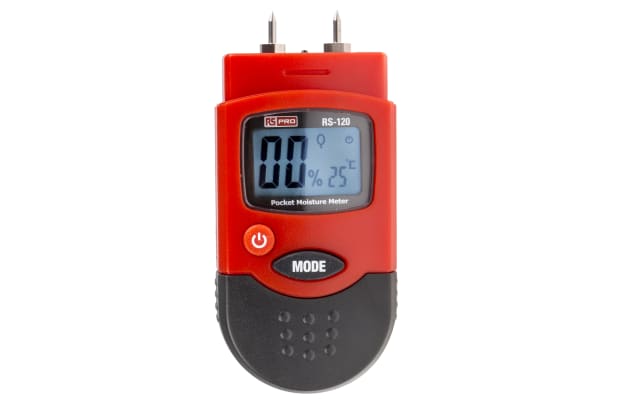The Science Behind Moisture Meters: Just How They Work and Why They're Essential
Wiki Article
The Ultimate Overview to Wetness Meters: A Comprehensive Summary and Exactly How They Can Conserve You Cash
In the world of structure upkeep, building, and numerous sectors, the significance of accurately determining wetness degrees can not be overstated. Wetness meters serve as crucial tools in spotting and keeping an eye on moisture material in products, assisting in avoiding pricey damages and ensuring the high quality of products. Recognizing the subtleties of various kinds of dampness meters, their applications, and the prospective cost-saving benefits they supply can be a game-changer for businesses and professionals alike. Uncovering just how these gadgets can not just streamline processes yet also contribute to monetary cost savings is a journey worth embarking on.Sorts Of Dampness Meters
Different kinds of moisture meters are offered for different applications in various sectors. One common type is the pin-type wetness meter, which gauges the electrical resistance between 2 pins inserted into a product. This kind is appropriate for wood, drywall, and various other structure products. Pinless dampness meters, on the other hand, use electro-magnetic sensing unit plates to scan a larger location without triggering damage to the material's surface. Moisture Meter. These meters are ideal for quickly assessing wetness levels in large locations such as wall surfaces and floors.
Infrared dampness meters gauge the thermal homes of a product to determine its wetness content non-invasively, making them helpful for applications where pin or pinless meters may not be appropriate. Recognizing the various kinds of wetness meters available can aid markets select the most ideal tool for their particular moisture measurement demands.

Benefits of Using Wetness Meters
Dampness meters provide invaluable advantages in properly analyzing and keeping track of moisture degrees in diverse products and settings. One of the primary advantages of making use of dampness meters is the avoidance of possible damages triggered by excess dampness.
Moreover, utilizing wetness meters can lead to enhanced energy efficiency. In agricultural setups, moisture meters play an essential function in enhancing plant yields by making it possible for farmers to monitor soil moisture degrees and make notified watering choices.
Exactly How to Select the Right Wetness Meter
When selecting a wetness meter, it's important to ensure that the meter is ideal for the details material you will be screening. Different products have varying electrical buildings that can impact wetness analyses, so selecting a meter created for your material is vital for precise outcomes. By meticulously reviewing these variables, you can select a moisture meter that fulfills your requirements and supplies exact dampness measurements for your jobs.Correct Methods for Moisture Meter Usage

Cost Savings Through Dampness Meter Applications
How can the strategic usage of wetness meters result in significant price savings throughout different industries? Wetness meters play an essential role in price savings by protecting against prospective damage and ensuring top quality control in different industries. In the farming sector, moisture meters help in identifying the ideal time for collecting plants, avoiding over-drying or excess moisture that can affect the end product's top quality. This precise tracking aids farmers prevent unneeded losses and maximize their return.
Similarly, in building, moisture meters assist prevent expensive problems by discovering moisture levels in structure materials, such as timber or concrete, which can lead to structural concerns if not addressed immediately. By identifying issue locations early on, service providers can take corrective procedures to avoid considerable repair work or substitutes, inevitably saving time and cash.
In addition, in the food processing market, dampness meters are necessary for keeping track of product quality and guaranteeing conformity with safety and security regulations. By precisely determining dampness material in food items, producers can prevent wasting, preserve freshness, and reduce waste, causing considerable expense financial savings. Generally, the calculated application of wetness meters is an important investment that can bring about significant price decreases and boosted efficiency across different markets.
Final Thought
To conclude, wetness meters are useful devices for measuring and discovering wetness degrees in different materials. By utilizing the right dampness meter and adhering to appropriate methods, individuals can successfully avoid costly damages brought on by excess dampness. Investing in a browse around here high quality moisture meter can lead to considerable expense financial savings in the long run by identifying possible problems at an early stage and enabling punctual removal. Ultimately, dampness meters are crucial instruments for maintaining the honesty and durability of frameworks and materials.Wetness meters serve as crucial tools in detecting and checking moisture content in products, assisting in avoiding pricey damages and guaranteeing the top quality of products. Infrared wetness meters gauge the thermal buildings of a material to identify its dampness content non-invasively, making them helpful for applications where pin or pinless meters might not be ideal.Moisture meters offer important advantages in accurately checking and evaluating moisture levels in varied materials and environments. In agricultural setups, wetness meters play a crucial function in enhancing crop returns by making it possible for farmers to monitor dirt moisture levels and make informed irrigation decisions.In verdict, moisture meters are useful devices for determining and discovering wetness degrees in various materials.
Report this wiki page